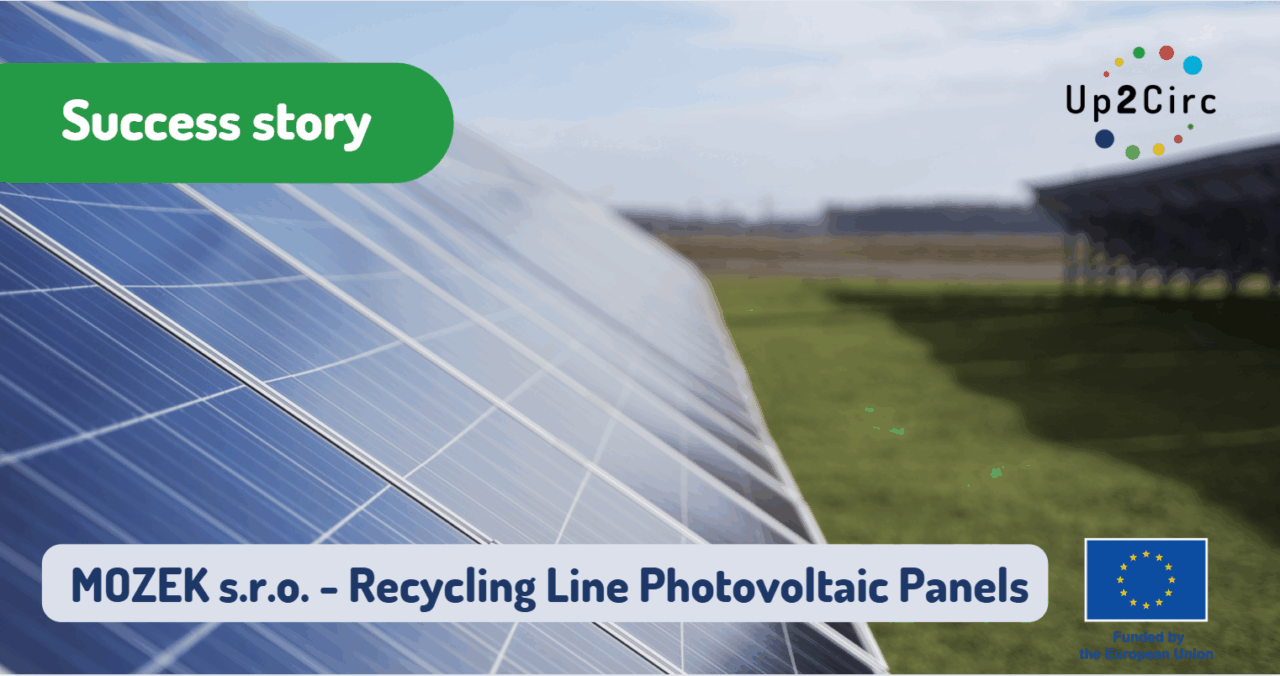Photovoltaic panels, which contain silicon and rare metals, are currently crushed and used as filler in concrete. The startup MOZEK s.r.o. wants to change that. Thanks to support from the Up2Circ program, the company has secured funding to develop a unique process that conserves resources and reduces emissions. Now, it’s preparing to build its first recycling lines.

SECTOR
Renewable Energy
CHALLENGE
Today, most photovoltaic panels are recycled by being crushed – glass, plastics, and rare metals all ground together. The resulting mix is often used as an additive in construction materials like concrete.
SOLUTION
Matěj Houdek, CEO of Mozek.sr.o., installs thousands of solar panels every year, so the question of what happens to them at the end of their life is something he can’t ignore. “Instead of destruction, we looked for a way to separate and recover the materials as gently as possible,” he explains. That’s what led him to start MOZEK.
CIRCULAR ECONOMY STRATEGIES/BUSINESS MODEL IMPLEMENTED
In collaboration with the University of Chemistry and Technology in Prague, the team tested a method called thermal oxidation, where panels are heated to 600°C. During the process, organic layers such as adhesives and plastics burn off, and the glass, silicon, metal conductors, and tiny fragments are separated for further sorting.
“And what’s key: this process allows us to safely recover valuable elements like silver and copper, which are currently lost in the rubble,” Houdek adds. The process is also energy-efficient – some of the heat generated can be reused to preheat additional panels.
Developing and validating this recycling method wouldn’t have been possible with internal funding alone. “Up2Circ brought us nearly €15,000 in funding – and that’s absolutely crucial for a project like this,” emphasizes the startup founder. With support from the program, they were able to collaborate with experts at the University of Chemistry and Technology and begin testing various technologies.
Some ideas were discarded along the way, but the trial-and-error approach ultimately led them to a solution that works – and has real-world application potential.
IMPACT
The team is now working on designing two types of recycling lines – a stationary one for use at recycling yards and a mobile one.
“The mobile version will fit into a shipping container and allow on-site recycling at large solar power plants. That way, we’ll save on transport costs and reduce emissions,” says Houdek. The startup’s goal is to launch its first recycling line by 2026 – ideally both the stationary and mobile versions.
And 2026 is a pivotal year.
“That’s when the first large-scale installations from the solar boom of 2010–2011 will start reaching the end of their lifespan,” Houdek explains. While many of these panels are still technically functional, replacing them with more efficient modern models often makes economic sense.
KEY TAKEAWAY
Looking ahead, MOZEK aims to serve not just the Czech market but to offer its solution internationally.
“Solar power is booming, but very few people are thinking about what will happen to the panels in 15 or 25 years. We’re solving that now,” concludes Houdek.
